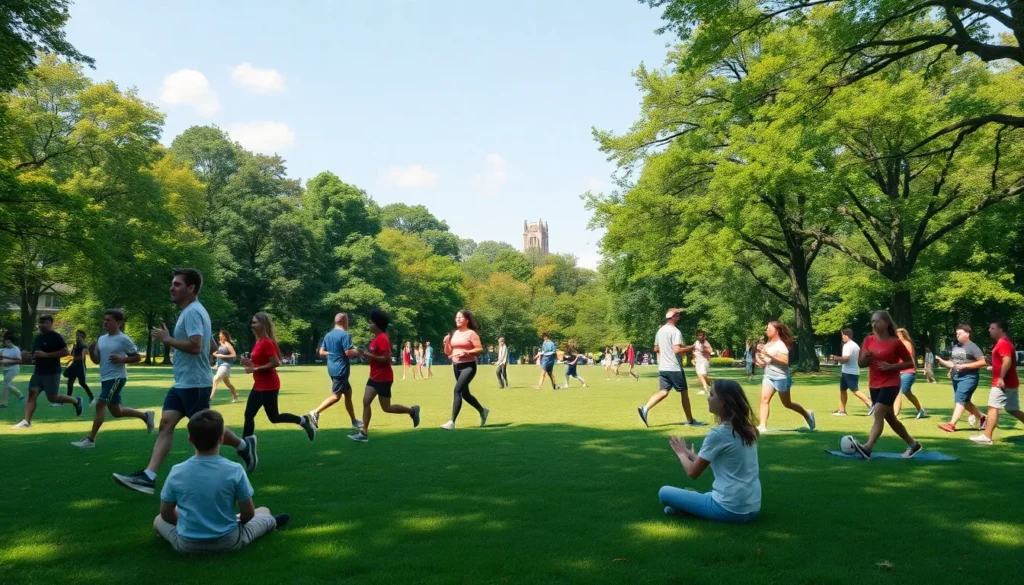Time can be a tricky little devil. One moment it drags on like a Monday morning meeting, and the next it zips by faster than a cat chasing a laser pointer. This fascinating phenomenon, known as time perception, shapes how people experience their lives, influencing everything from productivity to joy.
Table of Contents
ToggleOverview of Time Perception
Time perception refers to the subjective experience of time, which can vary greatly between individuals and situations. This phenomenon influences how people perceive the passage of time, impacting their productivity and enjoyment of life.
Several factors contribute to variations in time perception. Age plays a significant role; children often experience time as moving slowly, while adults may perceive it as speeding up. Emotional states also affect this perception. For instance, moments of intense joy or excitement often seem fleeting, whereas periods of boredom drag on.
Researchers categorize time perception into various dimensions. Objective time relates to measured intervals, like minutes or hours. Subjective time, however, reflects personal experiences and can differ even in similar environments. Neuroscientific studies reveal that certain brain regions, such as the supramarginal gyrus and the insula, are involved in processing temporal information.
Cultural influences shape how time is perceived as well. In cultures that prioritize punctuality, people typically develop an acute awareness of time, enhancing their productivity. Conversely, cultures that adopt a more relaxed approach to time may foster different experiences regarding daily activities.
Understanding time perception aids in addressing issues related to time management and productivity. Techniques such as mindfulness can enhance awareness of time, leading to improved life satisfaction. Exploring this intricate phenomenon helps individuals optimize their daily lives, making time a more valuable resource.
The Science Behind Time Perception

Time perception encompasses both biological mechanisms and psychological factors.
Biological Mechanisms
Neuroscience reveals that brain structures such as the right intraparietal sulcus and the prefrontal cortex play key roles in time perception. These regions process sensory information and help gauge intervals. Studies show that dopamine levels influence how time is perceived. Increased dopamine can distort time, making it feel longer. Conversely, reduced dopamine speeds up time perception. As individuals age, changes in brain function may alter their temporal experiences. Research indicates younger people often have more distinct time intervals compared to older adults. Variability in time perception relates directly to neural processing, making the biology behind time quite complex.
Psychological Factors
Subjective experiences shape how individuals perceive time. Emotional states significantly affect perception, with joy often making time seem to fly, while sadness can stretch moments. Attention also plays a crucial role; focused attention on an event typically results in a richer temporal experience. Flow states, in which individuals immerse themselves in activities, showcase a unique distortion of time. Cultural contexts further influence perception; cultures that prioritize punctuality often create heightened awareness of time. Personal memories and experiences modulate the feeling of time passing, leading individuals to perceive time differently based on their circumstances.
Time Perception in Different Contexts
Time perception varies significantly across various scenarios, affecting how people experience their daily lives. It shapes everything from routine activities to significant life events.
Everyday Experiences
In everyday life, time perception often depends on the level of engagement in an activity. Engaging activities can make time feel like it’s flying by. Conversely, tedious tasks can stretch moments, creating a sense of boredom. The perception of time also differs during routine activities compared to novel experiences. New experiences can feel longer because of heightened awareness. Familiar routines may feel quick and uneventful as they lack the same level of attention. Emotional states play a crucial role, too; happiness typically leads to quicker perceptions of time, whereas stress or frustration can slow it down.
Effects of Age and Cognitive Function
Age significantly impacts how individuals perceive time. Younger individuals often experience time as moving slowly, as they process new experiences more intensely. With age, many report an accelerated perception of time due to familiarity with routines. Cognitive function also affects this perception; individuals with diminished cognitive abilities may struggle to distinguish between short time intervals. Neurological studies show that brain changes over time influence how people perceive time lapses. Interestingly, the interplay between cognitive load and time perception shows that distractions can alter one’s sense of time duration.
Cultural Influences on Time Perception
Culture significantly shapes time perception, affecting how individuals experience the passage of time. In cultures with a strong emphasis on punctuality, such as Germany and Switzerland, people often develop an acute awareness of time’s value. This awareness fosters efficiency, leading individuals to organize their activities based on strict time schedules.
Contrarily, in cultures where flexibility is prioritized, such as in many Latin American nations, the perception of time tends to be more fluid. Here, social interactions and relationships take precedence over strict time adherence, creating a more relaxed approach to daily activities. Consequently, this cultural backdrop can result in individuals experiencing time as more expansive.
Festivals and communal gatherings also influence how communities perceive time. Engaging in vibrant celebrations often reflects a collective sense of timelessness, where the focus shifts from clock time to shared moments. Individuals within these contexts report that time feels elongated, as immersion in the experience overrides the usual constraints of time.
Moreover, different cultural attitudes towards aging impact time perception. In societies that venerate age, such as Japan, older individuals may perceive time through the lens of wisdom and reflection. This view often leads to a more measured experience of time, contrasting with cultures that emphasize youth and rapid accomplishment.
Technology’s role in shaping time perception cannot be overlooked. Digital communication fosters immediacy, pressuring individuals to respond quickly and feel a constant sense of urgency. Pervasive notifications can distort time awareness, making individuals feel as if they lack control over their schedules.
Recognizing these cultural influences equips individuals to understand their own time perceptions better. Awareness of these variances aids in fostering empathy and effective communication across diverse backgrounds.
Future Directions in Time Perception Research
Exploration of time perception continues to evolve, addressing intricate factors that shape this subjective experience. New studies focus on the neurological underpinnings of time perception, utilizing advanced imaging techniques to investigate brain activity during temporal judgment tasks. Interdisciplinary approaches involve collaboration between neuroscience, psychology, and cultural studies, enriching our understanding of how different contexts influence time perception.
Researchers aim to explore cross-cultural differences in temporal experience further. Upcoming studies may examine how globalization impacts local time perception, especially in increasingly interconnected societies. Attention also shifts toward the effects of technology on time awareness, with digital distractions constantly influencing how individuals experience time.
Empirical studies are likely to investigate the role of virtual reality in manipulating time perception. By creating immersive environments, researchers can analyze how altered sensory experiences affect the feeling of time passing. Additionally, examining the impact of chronic stress on time perception could shed light on mental health issues, particularly as society’s pace accelerates.
Innovative methodologies, including machine learning algorithms, might enhance the analysis of large datasets related to time perception. Such advancements could reveal subtle patterns and correlations that traditional methods may overlook. Apart from this, future research may delve into age-related changes in time perception, emphasizing differing experiences between generations.
The exploration of mindfulness practices as a tool for improving time perception represents another promising direction. Techniques aimed at enhancing present-moment awareness could alleviate feelings of time scarcity and promote overall well-being. Research focused on these diverse aspects of time perception fosters a deeper understanding while offering practical solutions to enhance life satisfaction and productivity.
Time perception is a complex and multifaceted experience that significantly shapes individuals’ lives. By understanding the various factors that influence how time is perceived, from emotional states to cultural contexts, individuals can gain valuable insights into their daily experiences.
Recognizing the impact of age and cognitive function on time perception can lead to more effective time management strategies. Additionally, embracing mindfulness practices may enhance awareness and appreciation of time, ultimately enriching life satisfaction.
As research continues to evolve, the exploration of time perception promises to unveil deeper connections between neuroscience, psychology, and culture, offering practical tools for navigating the intricacies of time in an increasingly fast-paced world.
